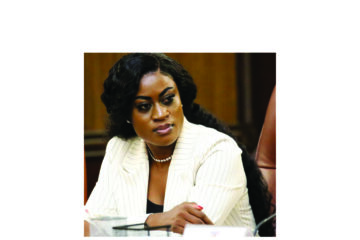Hertta-Maria Amutenja
The Namibia Local Businesses Association (NALOBA) has criticised the government’s reliance on foreign borrowing.
NALOBA’s vice president, Peter Kanu Amadhila at the start of this week highlighted the national debt, which currently stands at N$153.8 billion, emphasising its potential impact on future generations.
“It is irresponsible borrowing. Namibia is not supposed to be borrowing money from other countries,” he said.
Amadhila said Namibia, which was once envisioned as a prosperous lender rather than a borrower, faces a concerning trend of prioritising borrowed funds over sustainable economic strategies.
“Our country was supposed to be lending money to other countries! A rich country with few people, for that matter! Every citizen was supposed to be well off, eating nice, making love nice, but now it is the opposite.
Amadhila further urged leaders to reconsider their fiscal strategies and encouraged collaboration with NALOBA to develop a sustainable economic plan.
“Our leaders, please stop borrowing and engage NALOBA for a lasting plan to take our country to true prosperity, not just the word ‘prosperity’ you are preaching,” he said.
Economist Josef Sheehama echoed these concerns, noting that despite a decline in the debt-to-GDP ratio to 66%, the country’s debt obligations remain important.
“Although Namibia’s government debt increased to N$ 153.8 billion in nominal dollars, the country has managed to lower its debt as a percentage of GDP from 67.2 percent to 66 percent despite a slowdown in economic growth. Comparatively speaking, Namibia is in a better position. For example, Zambia saw a large increase, reaching 98 percent in 2022,” Sheehama stated.
Sheehama stressed the need for practical fiscal management, highlighting that the current debt level, while significant, is still manageable.
“Repaying costly loans has reduced the amount available for national development projects. Because more revenue is being diverted from other sources to debt servicing, rising debt means fewer economic opportunities for Namibians and more development projects will be delayed,” he explained.
Sheehama also warned of the broader economic implications of continued borrowing.
“Growing debt retards economic growth by discouraging business investment. A balanced approach to fiscal policy will include strategies for raising revenue, maintaining budgetary discipline, and avoiding additional borrowing,” Sheehama added.
He advocated using long-term debt exclusively for infrastructure investment rather than for ongoing operational costs.
“The debt policy should consider the capital improvement plan to demonstrate that the authority is committed to long-term capital planning for development rather than consumption or operation,” Sheehama advised.
In its first quarter report for 2024, BoN noted that exchange rate depreciation, the disbursement of funds from the KFW Development Bank, and a loan from the African Development Bank (AfDB) all contributed to the increase in external debt.
Despite this increase, the central government’s debt stock and loan guarantees, as a percentage of GDP, declined by the end of March 2024 compared to the same period a year ago.
BoN reported that the government debt stock fell to 66.0% of GDP at the end of March 2024, down from 67.2% in the corresponding period of the previous year.




